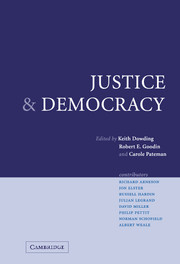Book contents
- Frontmatter
- Contents
- List of figures
- List of contributors
- 1 Introduction: between justice and democracy
- 2 Are democratic and just institutions the same?
- 3 Democracy is not intrinsically just
- 4 ‘The probability of a fit choice’: American political history and voting theory
- 5 Contractarian theory, deliberative democracy and general agreement
- 6 Democracy, justice and impartiality
- 7 Mimicking impartiality
- 8 Justice, democracy and public goods
- 9 The common good
- 10 Individual choice and social exclusion
- 11 Subnational groups and globalization
- References
- Brian Barry's publications
- Index
5 - Contractarian theory, deliberative democracy and general agreement
Published online by Cambridge University Press: 22 September 2009
- Frontmatter
- Contents
- List of figures
- List of contributors
- 1 Introduction: between justice and democracy
- 2 Are democratic and just institutions the same?
- 3 Democracy is not intrinsically just
- 4 ‘The probability of a fit choice’: American political history and voting theory
- 5 Contractarian theory, deliberative democracy and general agreement
- 6 Democracy, justice and impartiality
- 7 Mimicking impartiality
- 8 Justice, democracy and public goods
- 9 The common good
- 10 Individual choice and social exclusion
- 11 Subnational groups and globalization
- References
- Brian Barry's publications
- Index
Summary
The idea that only government by consent is legitimate government is a long-standing principle of liberal political theory. The claim is often advanced in terms of the idea of a social contract. Only those political arrangements, it is argued, that could be endorsed by parties to a social contract are to be thought of as justifiable. The principle of government by consent is thus rendered in terms of the idiom of hypothetical general agreement to a social contract, the terms of which define a just basic structure of society. Recently, theorists of democracy have taken a deliberative turn, and have argued that democracy is to be understood as a system of public discussion in which general agreement is sought on political principles and public policies. Setting the deliberative claim alongside that of social contract theory highlights the extent to which the principle of general agreement has become a touchstone of contemporary political theory.
Contemporary social contract theory is of course diverse in character. Barry (1995), Gauthier (1986), Harsanyi (1976), Rawls (1996; 1999) and Scanlon (1982), as well as those whom they have inspired, hold to various versions of the theory of the social contract, making different assumptions about the nature of the parties, their reasoning and the function that an appeal to the social contract is supposed to serve. This diversity is nevertheless quite compatible with saying that the appeal to contractual reasoning will characteristically impose constraints on the theory of political principles that can be adopted.
- Type
- Chapter
- Information
- Justice and DemocracyEssays for Brian Barry, pp. 79 - 96Publisher: Cambridge University PressPrint publication year: 2004
- 6
- Cited by

